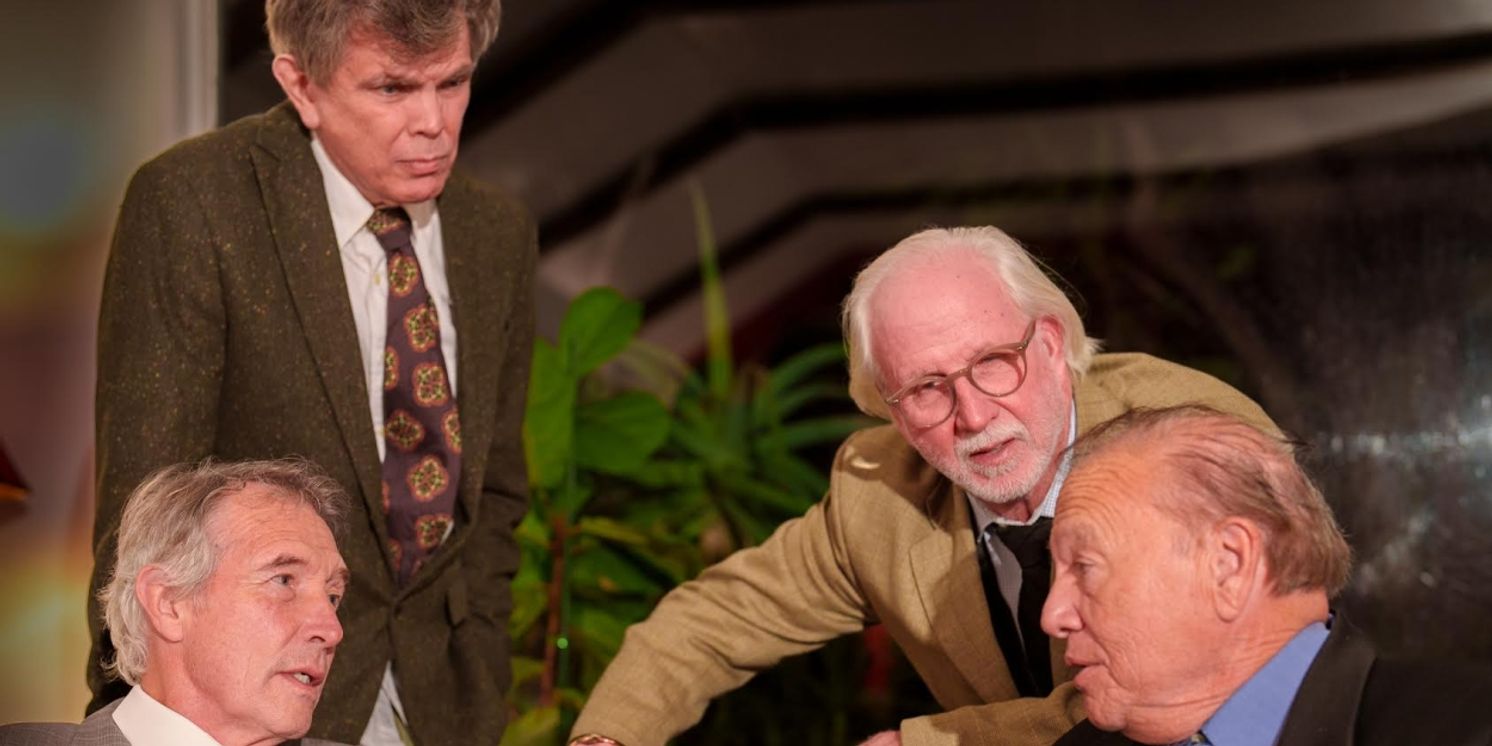Review: FARM HALL at Pico Playhouse
Birth of the bomb (almost) tale from Topanga Actors Company

Following the end of World War II, six German scientists are rounded up and essentially held prisoner in England so that the allies can covertly spy on them and glean information about their wartime attempts to develop the atomic bomb. In her inspired-by-true-events play, FARM HALL, playwright Katherine Moar invites us to consider these men not as researchers or even as Nazis (which several of them were) but as regular people with actual human emotions like jealousy, regret, fear, pettiness and pride.
Well and good. Each of the real-life men in question could probably inspire an individual play about their lives and work (and one of them already has). Thrown together, they’re a rather boring lot as depicted in FARM HALL’S American premiere at the Promenade Playhouse. The production’s thrifty staging directed by Judith Hendra for Topanga Actors Company feels stagnant instead of urgent, indifferent where it could have been thought-provoking. The performances are largely mediocre, and the entire effort feels under-rehearsed. Loar was inspired by reading the transcripts of the recorded conversation. Even with OPPENHEIMER working its box office magic in the summer of 2023 rekindling an interest in nuclear scientists, FARM HALL feels like it might have worked more successfully as a radio play.
As previously stated, our players are decidedly some intellectual heavy hitters. Otto Hahn (played by Tom Waters), the father of nuclear chemistry, discoverer of nuclear fission and a Nobel Prize winning chemist. Fellow Nobel Prize winner Max Von Laue (Patrick Skelton) contributed to the science of optics, quantum theory, superconductivity and the theory of relativity, guiding his country’s scientific research and development for four decades. Kurt Diebner (Mark Irvingsen) led the German nuclear weapons program.
On it goes. Werner Heisenberg (Edward Giron), theoretical physicist, quantum mechanics theory pioneer and leader of the uncertainty principle is yet another future Nobel Prize winner. Erich Rudolf Bagge (Ben Birmingham), one of Heisenberg’s students, worked on the German nuclear energy project. And son of a diplomat Carl Friedrich von Weizsäcker (Andy Spring) was another lead scientist on the team working on the German atomic bomb. So they all know each other, some as mentor/mentees, others as bitter rivals.
While all of these men were prominent enough for the Brits to be keeping an eye on them, Hahn and Von Laue (each of whom would have been in their mid-sixties during the Farm Hall events) are presented here are as the distinguished elder statemen. Heisenberg (also quite famous) and Diebner are a couple of decades younger and Bagge and von Weizsäcker (both 33) have their lives and careers ahead of them. There’s some rather cursory acknowledgment that a couple of these folks have families who they miss and are unable to contact, but at about 100 minutes, the play doesn’t offer a lot of time for humanizing or biographical insight. Overseeing the imprisonment is a British officer we never encounter named Major Rittner. There’s some reference to the material comforts of Farm Hall and its surroundings, but you sure wouldn’t know it by looking at the mean, cluttered and uncomfortable looking furnishings that make up the Promenade Playhouse set
Mostly our men of science pass the tedious hours playing chess, reading books, reciting snippets of their favorite American movies, repairing a piano and attempting to act out a scene from Noel Coward’s BLITHE SPIRIT. They contemplate plans once they are released (assuming they’re not executed). Ultimately, they end up at each other and nearly coming to blows. A couple of months in, as they’re already feeling stir crazy, the men turn on a radio and listen to the announcement of the bombing of Hiroshima. “The Allies have spent five hundred million pounds on what President Truman calls the greatest scientific gamble in history,” drones the BBC announcer voiced by Nick Ullett. “And they’ve won.”
Which means the prisoners of FARM HALL have lost. They have been beaten to the scientific achievement that was supposed to define their respective lives. This leads the scientists to reconsider elements of their work to figure out where they missed. And deeper revelations of what might have been. “If we had got here first, Diebner would have been sitting in Luxembourg as a war criminal,” says Weizsacker. “You’d be sitting next to me,” returns Diebner.
Ultimately, FARM HALL devolves into a multi-voiced discussion around ethics, what-ifs and culpability. Moar shunts the moral engine arbitrarily between Von Laue, Hahn and Heisenberg, but neither the play nor any of this company’s performances are compelling enough to get us to invest.
Granted it’s an unfair apples to bowling balls comparison, but anybody watching FARM HALL will invariably flash back to Christopher Nolan’s OPPENHEIMER, a story in which the action was a lot more terrifying and the stakes higher. A bit incongruously, I also thought of the smarty-pants physicists of THE BIG BANG THEORY, friends and rivals who were too brilliant and socially inept to stay out of each other’s way. Those guys at least were funny. The FARM HALL sextet? Just dull and morally doomed.
FARM HALL plays through February 2 at 10931 W. Pico Blvd., L.A.
Photo of (L-R) Patrick Skelton, Mark Irvingsen, Tom Waters and Edward Giron by Bill Pierce
Reader Reviews

Videos

